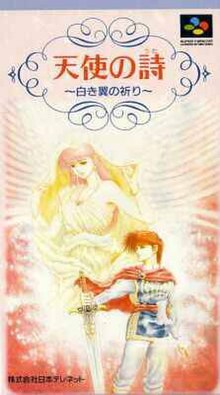Tenshi no Uta
Tenshi No Uta (天使の詩, lit. "Angel's Song") is a role-playing video game series produced by Telenet Japan. The series has a motif of Celtic mythology, while with the theme of the love between man and woman.
The series contains three titles: Tenshi No Uta (天使の詩) (1991), Tenshi no Uta II: Datenshi no Sentaku (天使の詩II 堕天使の選択, lit. "- Selection of the Fallen Angel") (1993), and Tenshi No Uta: Shiroki Tsubasa no Inori (天使の詩 〜白き翼の祈り〜, lit. "- Prayer of the White Wings") (1994).
Titles
Angel's Song
Tenshi No Uta (天使の詩) was released on 25 October 1991 for PC-Engine (TurboGrafx-16) Super CD-ROM². Characters were designed by Hiroshi Fuji (冨士宏).
Selection of the Fallen Angel
Tenshi no Uta II: Datenshi no Sentaku (天使の詩II 堕天使の選択, lit. "- Selection of the Fallen Angel") was released on 26 March 1993, and also released for Super CD-ROM². The game setting in a 100-year-after parallel universe of its predecessor. Characters were designed by Nobuteru Yūki.
Prayer of the White Wing
| Tenshi no Uta: Shiroki Tsubasa no Inori | |
|---|---|
 Cover art | |
| Publisher(s) | Nippon Telenet[1] |
| Designer(s) | Katsuya Inoue Kazuya Ishizuka Takayuki Kohno |
| Composer(s) | Motoi Sakuraba Shinji Tamura Hiroya Hatsushiba |
| Platform(s) | Super NES[1] |
| Genre(s) | Role-playing video game[1] |
| Mode(s) | Single-player |
Tenshi No Uta: Shiroki Tsubasa no Inori (天使の詩 〜白き翼の祈り〜, lit. "- Prayer of the White Wings")[2] is a video game published by Telenet Japan for the Super Famicom in 1994. It is the third episode in the Tenshi no Uta RPG series, but is not a true sequel to the first and second episodes previously released on the PC Engine. Many members of Wolfteam were involved with this project. It is the first time that Wolfteam members worked with many workers getting transferred from the Riot subsidiary.
Series regular Michiko Naruke was not tasked to compose for the game, so instead the music and sound design were provided by Wolfteam members Motoi Sakuraba, Shinji Tamura, and Hiroya Hatsushiba.
References
- ^ a b c d "Release information". GameFAQs. Retrieved 2010-07-18.
- ^ "English-Japanese title translation". SuperFamicom.org. Retrieved 2012-07-24.
